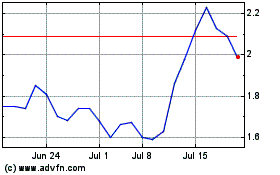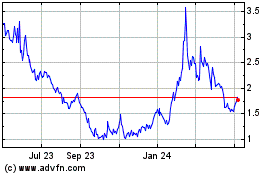Lexicon Develops Antibodies That Lower Triglycerides and Cholesterol as Potential New Therapy for Heart Disease
July 02 2007 - 6:00PM
PR Newswire (US)
- Publication of New Cardiovascular Target from Lexicon's Genetic
Research - THE WOODLANDS, Texas, July 2 /PRNewswire-FirstCall/ --
Lexicon Pharmaceuticals, Inc. (NASDAQ:LXRX) today reported results
from preclinical research demonstrating that antibodies directed to
a potential new target, angiopoietin-like protein 4 (ANGPTL4),
rapidly lower triglycerides and cholesterol. Research suggests that
a monoclonal antibody (mAb) targeting ANGPTL4 may have therapeutic
application in the treatment of cardiovascular disease. The results
appeared in an article, entitled "Lipid-lowering effects of
anti-angiopoietin-like 4 antibody recapitulate the lipid phenotype
found in angiopoietin-like 4 knockout mice," published in the July
10, 2007 edition of the journal Proceedings of the National Academy
of Sciences. Lexicon scientists first identified ANGPTL4 as a
potential target for cardiovascular disease using the company's
proprietary gene knockout technology. Lexicon scientists create
animal models that have alterations in specific genes in order to
discover the physiological and behavioral effects that result from
the loss of the protein encoded by the gene. Researchers found that
animal models in which the ANGPTL4 gene was knocked out had lower
triglyceride and cholesterol levels than normal animals. The
ANGPTL4 gene encodes a protein that is secreted into the
bloodstream and is now believed to play an important role in
triglyceride and cholesterol metabolism. Lexicon's biotherapeutics
group developed a monoclonal antibody as an injectable agent
targeting the ANGPTL4 protein to reproduce the triglyceride and
cholesterol- lowering effects identified in the animal models.
Notably, this appears to be the first successful production of a
monoclonal antibody to this target. "High triglycerides and
cholesterol are correlated with an increased risk of heart
disease," commented Dr. Brian P. Zambrowicz, executive vice
president and chief scientific officer at Lexicon and an author on
the paper. "The research our team published today may be an
important first step in the development of a new treatment for
severe cardiovascular disease, which continues to be the leading
cause of death in the United States." Earlier this year,
researchers at the University of Texas Southwestern Medical Center
in Dallas, the Institute of Molecular Medicine at the University of
Texas Health Science Center in Houston, and other collaborating
institutions found that individuals with a mutated ANGPTL4 gene
have significantly lower triglyceride levels and higher levels of
HDL cholesterol (or "good" cholesterol).(1) These results from
human genetic studies further support Lexicon's therapeutic
strategy based on original observations made using animal models.
Lexicon scientists discovered ANGPTL4's utility as a potential
cardiovascular disease target as part of its Genome5000(TM)
program, and the discovery was selected for inclusion in its
collaboration with Genentech, Inc. The collaboration with Genentech
was initiated in December 2002 to discover the functions of
secreted proteins and potential antibody targets identified through
Genentech's Secreted Protein Discovery Initiative (also referred to
as the SPDI program), and was expanded in November 2005 to include
the advanced research, development and commercialization of new
biologic drugs. Under the collaboration, Lexicon has the right to
develop and commercialize biotherapeutic drugs for up to six
targets. Genentech retains an option on the potential development
and commercialization of the biotherapeutic drugs that Lexicon
develops from the collaboration under a cost and profit sharing
arrangement. ANGPTL4, referred to internally as LG842, is one of
two targets already chosen by Lexicon for internal development.
Lexicon has already generated versions of ANGPTL4 monoclonal
antibodies that are currently in preclinical evaluation to identify
a potential clinical development candidate. Editor's Notes: -- The
article, "Lipid-lowering effects of anti-angiopoietin-like 4
antibody recapitulate the lipid phenotype found in
angiopoietin-like 4 knockout mice," may be found on the PNAS
website at http://www.pnas.org/ and downloaded by subscribers or
purchased through the Academy's short- term access program. -- For
more information on Lexicon's alliance with Genentech, please visit
the Lexicon website at http://www.lexpharma.com/ and select the
tab, Alliances. About Lexicon Lexicon is a biopharmaceutical
company focused on the discovery and development of breakthrough
treatments for human disease. Lexicon currently has clinical
programs underway for such areas of major unmet medical need as
irritable bowel syndrome and cognitive disorders. The company has
used its proprietary gene knockout technology to discover more than
100 promising drug targets and create an extensive pipeline of
clinical and preclinical programs in the therapeutic areas of
diabetes and obesity, cardiovascular disease, psychiatric and
neurological disorders, cancer, immune system disorders and
ophthalmic disease. To advance the development and
commercialization of its programs, Lexicon is working both
independently and through collaborators including Bristol-Myers
Squibb Company, Genentech, Inc., N.V. Organon and Takeda
Pharmaceutical Company Limited. For additional information about
Lexicon and its programs, please visit http://www.lexpharma.com/.
Safe Harbor Statement This press release contains "forward-looking
statements," including statements relating to Lexicon's research
and development of ANGPTL4 mAbs and the potential therapeutic and
commercial potential of ANGPTL4 mAbs. This press release also
contains forward-looking statements relating to Lexicon's growth
and future operating results, discovery and development of
products, strategic alliances and intellectual property, as well as
other matters that are not historical facts or information. All
forward-looking statements are based on management's current
assumptions and expectations and involve risks, uncertainties and
other important factors, specifically including those relating to
Lexicon's ability to successfully conduct preclinical and clinical
development of ANGPTL4 mAbs and its other potential drug
candidates, advance additional candidates into preclinical and
clinical development, obtain necessary regulatory approvals,
achieve its operational objectives, obtain patent protection for
its discoveries and establish strategic alliances, as well as
additional factors relating to manufacturing, intellectual property
rights, and the therapeutic or commercial value of its drug
candidates, that may cause Lexicon's actual results to be
materially different from any future results expressed or implied
by such forward-looking statements. Information identifying such
important factors is contained under "Factors Affecting
Forward-Looking Statements" and "Risk Factors" in Lexicon's annual
report on Form 10-K for the year ended December 31, 2006, as filed
with the Securities and Exchange Commission. Lexicon undertakes no
obligation to update or revise any such forward-looking statements,
whether as a result of new information, future events or otherwise.
(1)Stefano Romeo et al., "Population-based resequencing of ANGPTL4
uncovers variations that reduce triglycerides and increase HDL,"
Nature Genetics, April 2007. Contact for Lexicon: Bobbie Faulkner
Manager, Investor Relations 281/863-3503 DATASOURCE: Lexicon
CONTACT: Bobbie Faulkner, Manager, Investor Relations of Lexicon,
+1-281-863-3503, Web site: http://www.lexpharma.com/
Copyright
Lexicon Pharmaceuticals (NASDAQ:LXRX)
Historical Stock Chart
From Jun 2024 to Jul 2024

Lexicon Pharmaceuticals (NASDAQ:LXRX)
Historical Stock Chart
From Jul 2023 to Jul 2024
